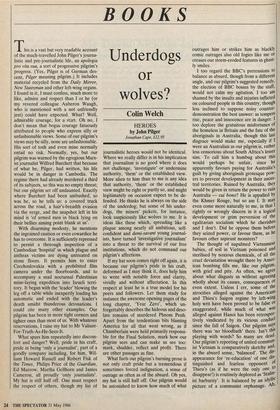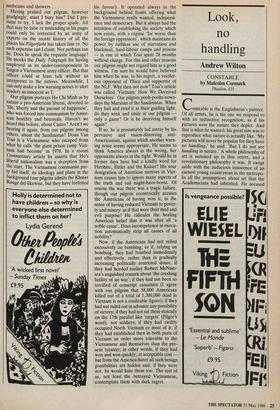BOOKS
Underdogs or wolves?
Colin Welch
HEROES by John Pilger This is a vast but very readable account of the much-travelled John Pilger's journa- listic and pre-journalistic life, an apologia pro vita sua, a sort of progressive pilgrim's progress. (Yes, Pilger is of German des- cent, Pilger meaning pilgrim.) It includes material recycled from the Daily Mirror, New Statesman and other left-wing organs. I found in it, I must confess, much more to like, admire and respect than I or he (or my revered colleague Auberon Waugh, who is mentioned with a not unfriendly jest) could have expected. What? Well, admirable courage, for a start. Oh no, I don't mean that bogus courage fatuously attributed to people who express silly or unfashionable views. Some of our pilgrim's views may be silly, none are unfashionable. His sort of tosh and even mine normally entail no risk. Normally, yes, but our pilgrim was warned by the egregious Marx- ist journalist Wilfred Burchett that because of what he, Pilger, had written, his life would be in danger in Cambodia. The regime there had already murdered a third of its subjects, so this was no empty threat; but our pilgrim set off undaunted. Exactly where Burchett had been ambushed, so was he, so he tells us: a covered truck across the road, a hair's-breadth evasion via the verge, and the snapshot left in his mind is 'of armed men in black lying on their bellies aiming point blank at us'.
With disarming modesty, he mentions the ingrained caution or even cowardice he has to overcome. It is sufficiently repressed to permit a thorough inspection of a Cambodian 'hospital' in which plague and anthrax victims are dying untreated on stone floors. It permits him to enter Czechoslovakia with a prohibited film camera under the floorboards, and to accompany a mad nocturnal Palestinian mine-laying expedition into Israeli terri- tory. It began with the 'leader' blowing the leg off a table while inexpertly loading his automatic and ended with the leader's death amidst thunderous detonations. I could cite many other examples. Our pilgrim has been in more tight corners and tighter ones than most of us. With whatever reservations, I raise my hat to Mr Valiant- For-Truth-As-He-Sees-It.
What spurs him repeatedly into discom- fort and danger? Well, pride in his craft, pride in being 'only a journalist', part of a goodly company including, for him, Wil- liam Howard Russell and Robert Fisk of the Times, Philips Price of the Guardian, Ed Murrow, Martha Gellhorn and James Cameron, all proudly 'only journalists'. My hat is still half off. One must respect the respect of others, though my list of
Jonathan Cape, f12.95
journalistic heroes would not be identical. Where we really differ is in his implication that journalism is no good where it does not challenge, 'investigate' or undermine authority, 'them' or the established view. More alien to him than to me is any idea that authority, 'them' or the established view might be right or partly so, and might legitimately on occasion expect to be de- fended. He thinks he is always on the side of the underdog; but some of his under- dogs, the miners' pickets, for instance, look suspiciously like wolves to me. It is ideas like these which, spreading like a plague among nearly all ambitious, self- confident and demi-savant young journal- ists, have turned 'investigative journalism' into a threat to the survival of our free institutions, which do not command our pilgrim's affections.
If my hat soon comes right off again, it is because our pilgrim's pride in his craft, deformed as I may think it, does help him to write with notable force and clarity, vividly and without affectation. In this respect at least he is a true model for his peers and followers. Let them study for instance the awesome opening pages of the long chapter, 'Year Zero', which un- forgettably describes the hideous and deso- late remains of murdered Phnom Penh. Apart from the tendentious bits blaming America for all that went wrong, as if Chamberlain were held primarily responsi- ble for the Final Solution, mark how our pilgrim sees and can make us see too: mark, shudder, reflect and profit. There are other passages as fine.
What fuels our pilgrim's burning prose is not only craft pride but a tremendous if sometimes forced indignation, a sense of outrage as often as of the absurd. Oh yes, my hat is still half off. Our pilgrim would be astonished to know how much of what outrages him or strikes him as blackly comic outrages also old fogies like me or creases our storm-eroded features in ghast- ly smiles. I too regard the BBC's pretensions to balance as absurd, though from a different angle, and our pilgrim's suggested remedy, the election of BBC bosses by the staff, would not calm my agitation. I too am shamed by the insults and injuries inflicted on coloured people in this country, though less inclined to suppose noisy counter- demonstration the best answer: as tempers rise, peace and innocence are in danger. I too deplore the gratuitous misfortunes of the homeless in Britain and the fate of the aboriginals in Australia, though this last disgrace would make me, especially if I were an Australian as our pilgrim is, rather less censorious about South Africa's lesser sins. To call him a humbug about this would perhaps be unfair, since he apparently favours paying for Australia's guilt by giving aboriginals grotesque pow- ers to prevent development in their ances- tral territories. Ruined by Australia, they would be given in return the power to ruin Australia — cui bono? He is appalled by the Khmer Rouge, but so am I. It may even come more naturally to me, in that I rightly or wrongly discern in it a logical development or grim perversion of the egalitarian socialism which he cherishes and I don't. Did he oppose them before they seized power, or favour them, as he favours other aspirant monsters? The thought of napalmed Vietnamese babies, of soil in Vietnam poisoned and sterilised by noxious chemicals, of all the cruel devastation wrought there by Amer- ican bombing fills me, like our pilgrim, with grief and pity. As often, we agree about what disgusts us without agreeing wholly about its causes, consequences or even extent. Unless I err, some of the atrocities alleged against the Americans and Thieu's Saigon regime by left-wing holy writ have been proved to be false or exaggerated, while much of what was alleged against Hanoi has been retrospec- tively vindicated by its vicious conduct since the fall of Saigon. Our pilgrim says there was `no bloodbath' there. Isn't this playing with words? So many are dead. Our pilgrim's reporting of united commiln" ist Vietnam is comparatively sketchy and in the absurd sense, 'balanced'. The dis- appearance for 're-education' of one dis; tinguished and fearless opponent of Thieu's (as if he were the only one to disappear!) is routinely deplored as 'Stalin- ist barbarity'. It is balanced by an idyllic picture of a communist orphanage. 10'
sunbeams and showers . .
Having praised our pilgrim, however grudgingly, must I bury him? Did I pre- sume to try, I lack the proper spade. All that may be false or misleading in his pages could only be corrected by an army of experts on the recent history of all the places his Pilgerfarht has taken him to. No such expertise can I claim. Nor perhaps can he. Does he speak the requisite language? He mocks the Daily Telegraph for having employed as its under-correspondent in Saigon a Vietnamese army officer. But that Officer could at least talk without an interpreter to the natives. Meanwhile, I can only make a few warning noises to alert readers as innocent as I.
Our pilgrim portrays Ho Chi Minh as by nature a pro-American liberal, devoted to `life, liberty and the pursuit of happiness', who was forced into communism by Amer- ican hostility and betrayals. Haven't we heard this before, about Castro? Aren't we hearing it again, from our pilgrim among others, about the Sandinistas? Doan Van Toai is a Vietnamese who escaped from what he calls 'the giant prison camp Viet- nam had become' in 1978. In a recent Commentary article he asserts that Ho's liberal nationalism was a deception from the start. The Vietnamese communist par- ty hid itself, its ideology and plans in the background (our pilgrim admits the Khmer Rouge did likewise, but they have forfeited
his favour). It operated always in the background behind fronts offering what the Vietnamese really wanted, independ- ence and democracy. But it always had the intention of establishing the society which now exists, with a regime 'far worse than the foreign oppressors', which maintains its power by ruthless use of starvation and blackmail, hard-labour camps and prisons — in one of which Toai spent 28 months without charge. For this and other reasons our pilgrim might not regard him as a good witness. I'm sure he would have believed him when he was, to his regret, a vocifer- ous opponent of Thieu and supporter of the NLF. Why then not now? Toai's article was called 'Vietnam: How We Deceived Ourselves'. Our pilgrim pooh-poohs nowa- days the Marxism of the Sandinistas. When they hail and extol it as their guiding light, do they wink and smile at our pilgrim only a game? Or is he deceiving himself again?
If so, he is presumably led astray by his pervasive and vision-distorting anti- Americanism, against which another warn- ing noise seems appropriate. He seems to think America always in the wrong, her opponents always in the right. Would he in former days have had a kindly word for Hirohito, Hitler and the Kaiser? His sour denigration of American motives in Viet- nam causes him to ignore many aspects of the truth and sad might-have-beens. Of course the war there was a tragic failure, though our pilgrim eccentrically accuses the Americans of having won it, in the sense of having reduced Vietnam to pover- ty and misery: as if that were their mad and evil purpose! He ridicules the healing American belief that it was after all 'a noble cause'. Does incompetence in execu- tion automatically strip all causes of all nobility?
Now, if the Americans had not relied excessively on bombing; or if, relying on bombing, they had bombed immediately and effectively, rather than in gradually increasing politically restricted doses; if they had heeded earlier Robert McNam- ara's anguished remark about 'the crushing futility of air war'; if they had not been so terrified of conscript casualties (I agree with our pilgrim that 58,000 Americans killed out of a total of 1,300,000 dead in Vietnam is not a creditable figure); if they had not ruled out in advance any possibility of victory; if they had not sat there stoically on the 17th parallel like 'targets' (Pilger's word), not soldiers; if they had swiftly occupied North Vietnam or most of it; if they had established then in both parts of Vietnam an order more tolerable to the Vietnamese and themselves than the pre- sent tyranny; in other words, if they had won and won quickly, at acceptable cost but from the America-hater all such benign possibilities are hidden and, if they were not, he would hate them too. The rest of us, not least the betrayed Vietnamese, contemplate them with dark regret.



























































 Previous page
Previous page